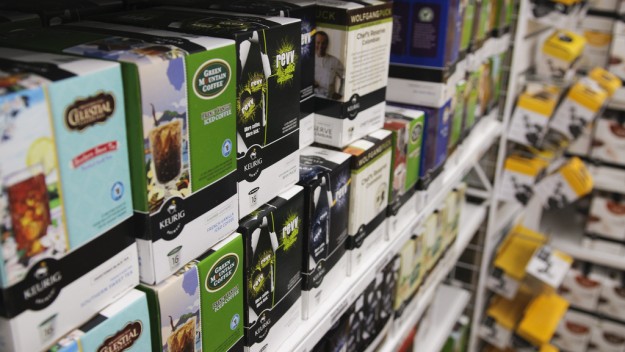Question: Can I recycle disposable coffee pods? What are my options?
Answer: In general, single-use coffee pods are difficult to recycle, but there are sustainable options for home and business owners looking to make the single-serve a little more sustainable.
A convenient way to brew
Disposal coffee pods have become a convenient way for members within the foodservice industry to provide customers with a strong cup of coffee, every time. According to Euromonitor, over the past five years, the demand for disposable coffee pods has boomed, rising over 523% between 2006-2011 in the United States alone. In addition to being purchased for use in the home, these disposable pods are particularly useful for restaurant and food stalls where coffee is not a staple product. Since their packaging protects coffee from exposure to oxygen, light and moisture, they are able to be stored for long periods of time without going bad.
The truth of the matter however, is that these disposable pods are nearly impossible to recycle and continue to add to piles of garbage being dumped in landfills. That being said, the process and options to dispose of used products differ by the top producers of machines and cups, pods or disks designed for single use. Here, we take a closer look at some of the biggest names in the business including Keurig, Tassimo, Flavia and Nespresso and the products and options they offer customers looking to invest in convenience, in a sustainable way.
Keurig
Keurig Coffee is the producer of Keurig Brewers and K-Cups, and is a subsidiary of Green Mountain Coffee, one of the largest players in the industry. On the Keurig website, following a vague statement about packaging being only part of the problem, the company admits that due to the complex packaging which includes the cup itself, a filter and an aluminium foil top designed to retain quality and freshness, the cups are not, in fact, recyclable.
On the Green Mountain Coffee website however, you can watch a video that explains, in detail, some steps taken by the client in pursuit of sustainable alternatives. These include K-Cup packs for Tea that are made with paper and fully recyclable; a reusable filter assembly (My K-Cup) that allows you to use your own freshly ground coffee to produce a fresh, quick and greener single serving; and a program called “Grounds to Grow on” which diverts K-Cup packs from landfills by turning 75% of the waste into compost and 25% to create energy. Unfortunately, this project is only available throughout the United States.
Logistics is also a problem for customers in Canada using the Vue Brewing system, part of the Keurig product line. As opposed to the Keurig Brewing system, the Vue Brewing System, uses cups that can be recycled wherever polypropylene #5 plastic –a plastic that is BPA free (see our article on plastic bottles and the environment) – is accepted. As opposed to K-Cups, Vue cups can be separated into parts that are, and are not recyclable. Where recycling is not available, customers in the United States can take advantage of a mail-back program designed to divert cups from landfills.
Tassimo
Tassimo, owned by Kraft Foods, is another market leader in disposable coffee pods and are the producers of the T-Disc. According to the Tassimo website, the T-Disc outer bag is made with an aluminium, polyester and polyethylene laminate that is suitable for energy recovery through incineration and the inner carton dispenser is composed of paperboard, which is 100% recyclable. When it comes to the T-Disc itself, much like the K-Cup, where plastic collection systems exist, if you remove the label, you can deposit the disc in the non-PET blue box.
For Canadian customers and business owners looking to cut down on waste created by disposable coffee pods, Tassimo may be the way to go. Having recently partnered with TerraCycle, Tassimo users can now ship used T-Discs in cardboard boxes using a prepaid shipping label back to TerraCycle. TerraCycle will then recycle the used Discs and turn them into eco-friendly products like watering cans, benches, cutting boards etc. And, as added incentive to send back your discs, TerraCycle and Tassimo will give your collection location two TerraCycle points (redeemable for charitable gifts) or $.02 to the non-profit organization or school of your choice.
Flavia
In accordance with the coffee pod trend, Flavia, created by Mars Inc., uses Freshpacks in order to serve coffee, tea and hot chocolate, one cup at a time. While their Freshpacks are not currently recyclable, the company states on their website that they are seeking to produce 100% recyclable Freshpacks by 2015. For the time being however, like Tassimo, Flavia has also partnered with TerraCycle to create a program that allows you to send back used Freshpacks that will then be used to produce post-consumer recycled material.
Nespresso
Last on our list of one cup wonder producers is Nespresso. According to Quick-Cup Coffee, the Nespresso one-cup brewing system, unlike other systems, do, in fact, use packages made from aluminium which are fully recyclable. Customers however, using the Gemini brewers which are often found in offices and use Nespresso capsules that are made using a combination of aluminium and plastic, will face similar frustrations as those encountered with the T-Discs, K-Cups and Flavia Freshpacks. Due to the mixture of aluminium and plastic materials, these capsules are non-recyclable.
If however, you want to go a bit out of your way to recycle your capsules, you can drop them off at specific locations around your area; yes, even in Canada! It may not be as convenient as sending your capsules back via prepaid shipping to a third party disposal unit, but with two collection points in Toronto (Nespresso at The Bay and Home Outfitters), it does give customers the opportunity to go green.
Comments about disposal coffee pods? Leave your thoughts below!
image credit: HighingFly



















